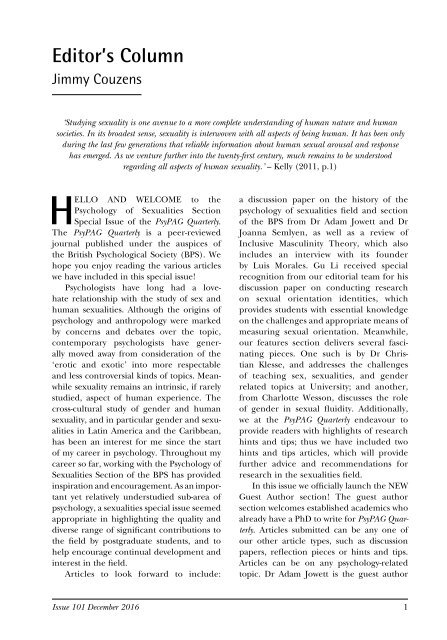Also in this issue
2gT2ktK
2gT2ktK
Create successful ePaper yourself
Turn your PDF publications into a flip-book with our unique Google optimized e-Paper software.
Editor’s Column<br />
Jimmy Couzens<br />
‘Study<strong>in</strong>g sexuality is one avenue to a more complete understand<strong>in</strong>g of human nature and human<br />
societies. In its broadest sense, sexuality is <strong>in</strong>terwoven with all aspects of be<strong>in</strong>g human. It has been only<br />
dur<strong>in</strong>g the last few generations that reliable <strong>in</strong>formation about human sexual arousal and response<br />
has emerged. As we venture further <strong>in</strong>to the twenty-first century, much rema<strong>in</strong>s to be understood<br />
regard<strong>in</strong>g all aspects of human sexuality.’ – Kelly (2011, p.1)<br />
HELLO AND WELCOME to the<br />
Psychology of Sexualities Section<br />
Special Issue of the PsyPAG Quarterly.<br />
The PsyPAG Quarterly is a peer-reviewed<br />
journal published under the auspices of<br />
the British Psychological Society (BPS). We<br />
hope you enjoy read<strong>in</strong>g the various articles<br />
we have <strong>in</strong>cluded <strong>in</strong> <strong>this</strong> special <strong>issue</strong>!<br />
Psychologists have long had a lovehate<br />
relationship with the study of sex and<br />
human sexualities. Although the orig<strong>in</strong>s of<br />
psychology and anthropology were marked<br />
by concerns and debates over the topic,<br />
contemporary psychologists have generally<br />
moved away from consideration of the<br />
‘erotic and exotic’ <strong>in</strong>to more respectable<br />
and less controversial k<strong>in</strong>ds of topics. Meanwhile<br />
sexuality rema<strong>in</strong>s an <strong>in</strong>tr<strong>in</strong>sic, if rarely<br />
studied, aspect of human experience. The<br />
cross-cultural study of gender and human<br />
sexuality, and <strong>in</strong> particular gender and sexualities<br />
<strong>in</strong> Lat<strong>in</strong> America and the Caribbean,<br />
has been an <strong>in</strong>terest for me s<strong>in</strong>ce the start<br />
of my career <strong>in</strong> psychology. Throughout my<br />
career so far, work<strong>in</strong>g with the Psychology of<br />
Sexualities Section of the BPS has provided<br />
<strong>in</strong>spiration and encouragement. As an important<br />
yet relatively understudied sub-area of<br />
psychology, a sexualities special <strong>issue</strong> seemed<br />
appropriate <strong>in</strong> highlight<strong>in</strong>g the quality and<br />
diverse range of significant contributions to<br />
the field by postgraduate students, and to<br />
help encourage cont<strong>in</strong>ual development and<br />
<strong>in</strong>terest <strong>in</strong> the field.<br />
Articles to look forward to <strong>in</strong>clude:<br />
a discussion paper on the history of the<br />
psychology of sexualities field and section<br />
of the BPS from Dr Adam Jowett and Dr<br />
Joanna Semlyen, as well as a review of<br />
Inclusive Mascul<strong>in</strong>ity Theory, which also<br />
<strong>in</strong>cludes an <strong>in</strong>terview with its founder<br />
by Luis Morales. Gu Li received special<br />
recognition from our editorial team for his<br />
discussion paper on conduct<strong>in</strong>g research<br />
on sexual orientation identities, which<br />
provides students with essential knowledge<br />
on the challenges and appropriate means of<br />
measur<strong>in</strong>g sexual orientation. Meanwhile,<br />
our features section delivers several fasc<strong>in</strong>at<strong>in</strong>g<br />
pieces. One such is by Dr Christian<br />
Klesse, and addresses the challenges<br />
of teach<strong>in</strong>g sex, sexualities, and gender<br />
related topics at University; and another,<br />
from Charlotte Wesson, discusses the role<br />
of gender <strong>in</strong> sexual fluidity. Additionally,<br />
we at the PsyPAG Quarterly endeavour to<br />
provide readers with highlights of research<br />
h<strong>in</strong>ts and tips; thus we have <strong>in</strong>cluded two<br />
h<strong>in</strong>ts and tips articles, which will provide<br />
further advice and recommendations for<br />
research <strong>in</strong> the sexualities field.<br />
In <strong>this</strong> <strong>issue</strong> we officially launch the NEW<br />
Guest Author section! The guest author<br />
section welcomes established academics who<br />
already have a PhD to write for PsyPAG Quarterly.<br />
Articles submitted can be any one of<br />
our other article types, such as discussion<br />
papers, reflection pieces or h<strong>in</strong>ts and tips.<br />
Articles can be on any psychology-related<br />
topic. Dr Adam Jowett is the guest author<br />
Issue 101 December 2016 1


